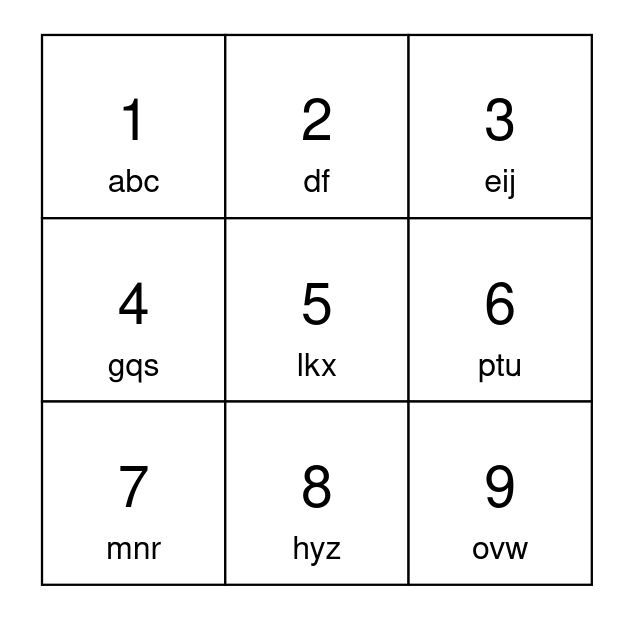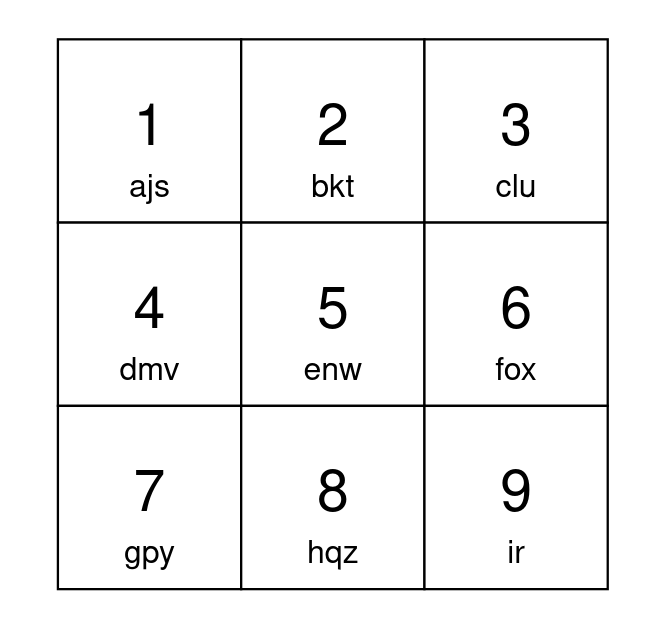You have a keypad with 9 buttons, numbered from 1 to 9, each mapped to lowercase English letters. You can choose which characters each button is matched to as long as:
- All 26 lowercase English letters are mapped to.
- Each character is mapped to by exactly
1button. - Each button maps to at most
3characters.
To type the first character matched to a button, you press the button once. To type the second character, you press the button twice, and so on.
Given a string s, return the minimum number of keypresses needed to type s using your keypad.
Note that the characters mapped to by each button, and the order they are mapped in cannot be changed.
Example 1:
Input: s = "apple" Output: 5 Explanation: One optimal way to setup your keypad is shown above. Type 'a' by pressing button 1 once. Type 'p' by pressing button 6 once. Type 'p' by pressing button 6 once. Type 'l' by pressing button 5 once. Type 'e' by pressing button 3 once. A total of 5 button presses are needed, so return 5.
Example 2:
Input: s = "abcdefghijkl" Output: 15 Explanation: One optimal way to setup your keypad is shown above. The letters 'a' to 'i' can each be typed by pressing a button once. Type 'j' by pressing button 1 twice. Type 'k' by pressing button 2 twice. Type 'l' by pressing button 3 twice. A total of 15 button presses are needed, so return 15.
Constraints:
1 <= s.length <= 105sconsists of lowercase English letters.
class Solution:
def minimumKeypresses(self, s: str) -> int:
cnt = Counter(s)
ans = 0
i, j = 0, 1
for v in sorted(cnt.values(), reverse=True):
i += 1
ans += j * v
if i % 9 == 0:
j += 1
return ansclass Solution {
public int minimumKeypresses(String s) {
int[] cnt = new int[26];
for (char c : s.toCharArray()) {
++cnt[c - 'a'];
}
Arrays.sort(cnt);
int ans = 0;
for (int i = 1, j = 1; i <= 26; ++i) {
ans += j * cnt[26 - i];
if (i % 9 == 0) {
++j;
}
}
return ans;
}
}class Solution {
public:
int minimumKeypresses(string s) {
vector<int> cnt(26);
for (char& c : s) ++cnt[c - 'a'];
sort(cnt.begin(), cnt.end());
int ans = 0;
for (int i = 1, j = 1; i <= 26; ++i) {
ans += j * cnt[26 - i];
if (i % 9 == 0) ++j;
}
return ans;
}
};func minimumKeypresses(s string) int {
cnt := make([]int, 26)
for _, c := range s {
cnt[c-'a']++
}
sort.Ints(cnt)
ans := 0
for i, j := 1, 1; i <= 26; i++ {
ans += j * cnt[26-i]
if i%9 == 0 {
j++
}
}
return ans
}
